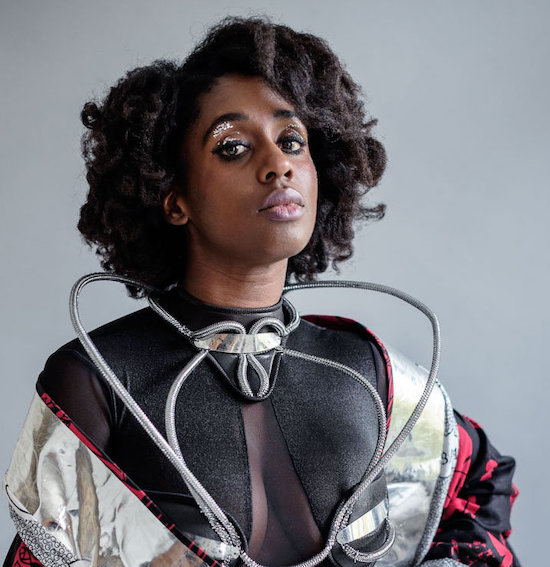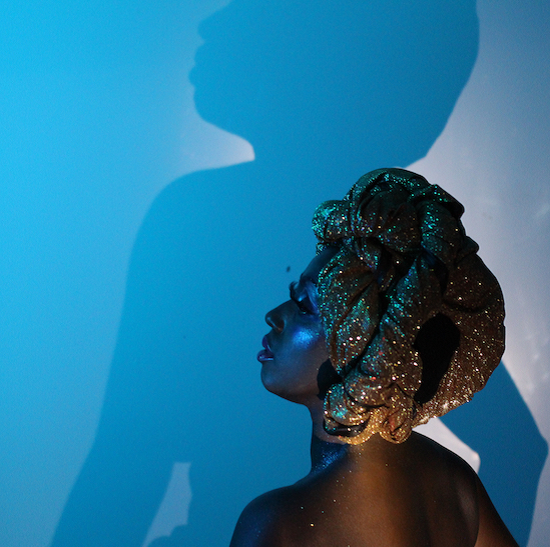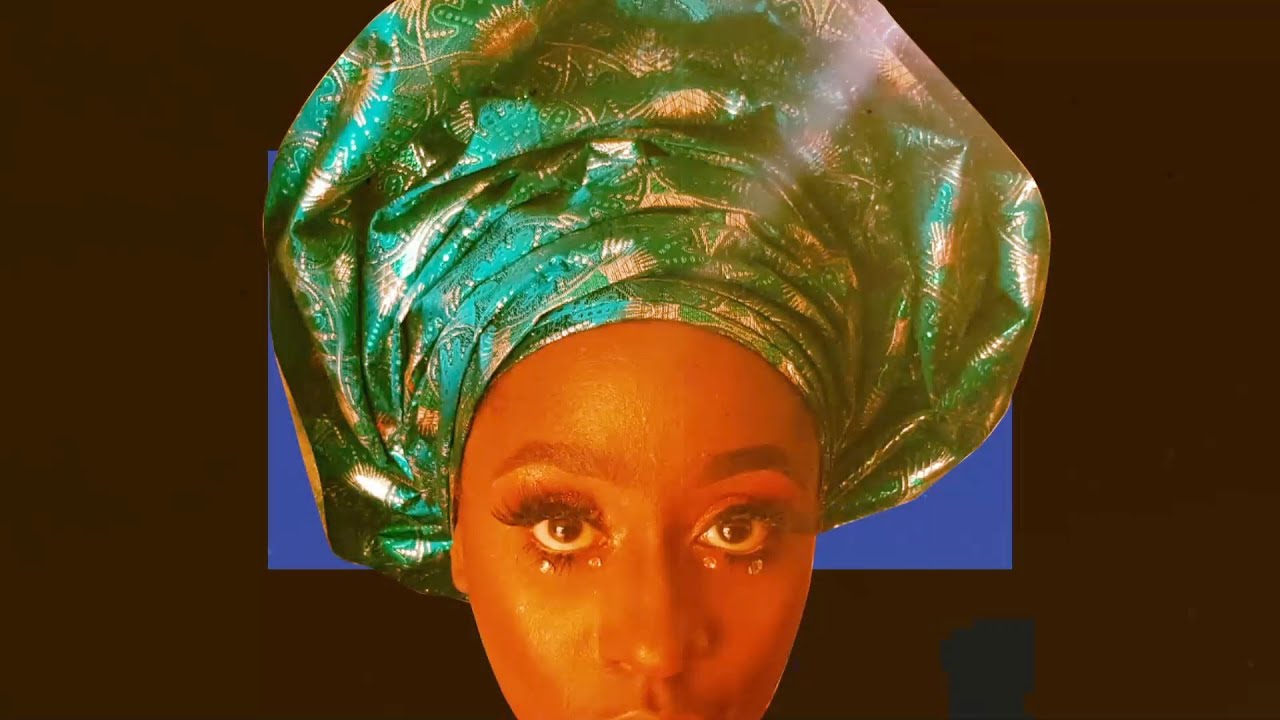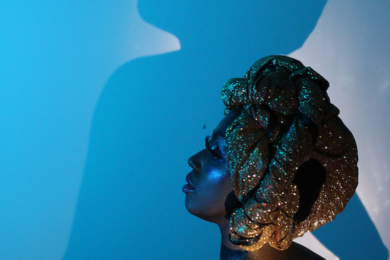Like her music, a conversation with Nwando Ebizie can move at a mile a minute, hopping from literary references to personal anecdotes to psychological theories, all without the thread being lost. She makes multi-sensory art which explores connections between neurodiversity, the Black Atlantic, speculative myth-making and the threat of the manosphere. Her research is wide-reaching, and her tools are ever-changing, but it is ritual that sits at the heart.
At the end of this week she’ll be overseeing her biggest ritual yet – a three-day ceremony at the Southbank Centre as part of The Black Fantastic. It coincides with the release of her new album, The Swan. The two work together as an outer-ritual and inner-ritual. It’s a culmination of her many interests, and the beginning of a new chapter. Written largely in solitude in her home in Todmorden during the pandemic, Ebizie always envisaged the record as a physical ceremony, and she’s eager to see it come to life.
“This show that Ekow Eshun has curated at the Hayward, the Black Fantastic, it’s a really great phrase for it. I’m happy to be finding new vocabulary for this kind of speculative mythmaking which is what this project’s been about.”
“That feeling of going down the streets all together as one, it’s so ecstatic,” she says. “There’s nothing else really like it. I am always trying to find that feeling. That’s one of the things I want to draw out in performance. I’m not really interested in performance. I’m interested in ritual, which has that possibility of participation, on many different levels.”
There’s a physicality to the record that captures this feeling. In search of a street procession atmosphere, Ebizie collaborated with local Calder Valley artists such as trombonists Sophie Cooper and Rosie Torton. Her proximity to local artistry provided a practical way to enhance the album’s expansive, genre-blurring sound, while the landscape around her provided inner inspiration.
“When writing the song ‘Something Like Empathy’, I was inspired by being up on the moors a lot. There was one particular night where the wind was high. I went up there and leant my body diagonally out onto this wind. I’d go up there for answers. I’d go up there when I was angry, when I was grieving, to shift things around.”
“Aside from that, it all really exists in a speculative ritual space. It’s all part of the meta-narrative of this universe; there’s this society of women who exist in our present and future and past. It’s told through what they find, what they are talking about and celebrating.”
On ‘I Seduce’, the album’s satirical and deeply sinister single, Ebizie plays a group of girls from a future society who stumble upon the horror of the manosphere, and wonder what the women of our time could have done to be hated so much.
“Imagine in this alternate universe, there are these young girls in this culture who are researching the past, and they’re reading up on Jordan Peterson. They’re just trying to understand it by enacting it: ‘Who are these women that they are talking about? They sound evil! Wow, what was this culture?’ When you try to understand this logic through their lens, it’s [clear it is] so hateful and childish. I like anthropologising people who don’t normally get anthropologised.”
Ebizie does not easily spell out her meta-narrative within songs themselves, so it’s potentially surprising to hear the song would be inspired by an embarrassing element of contemporary culture. For Ebizie, it acted as her way of work through the horrible parts of the present through lessons of the past, and visions of the future.
“The way I process things has always been physical. That physical engagement can be ecstatic. We’re not in the world of a good experience or a bad experience, we’re talking about a deep experience” she says of the song.
“I’m always really interested in the closeness between crazy laughing and wailing. When you watch Stewart Lee for example, something really funny and horrible can happen at the same time.”
The Swan as a performance is not a finished statement, but a living, breathing entity. What Ebizie wants to present are possibilities for her audience to explore through participation.
Each new sensory exploration is connected to its themes. Take her current work with perfumer Ezra-Lloyd Jackson, who taught her about the origins of incense in Somalia. She’s never finished looking for new avenues to explore sensory rituals. “It’s about the community. It’s about giving the community what it needs”, she explains.
“What are we trying to do here? What are we trying to change? I want to create experiences. It’s experiential art, because we’re not dealing with eschatological time. This is not my culture. It’s about creating a more than human timescale, going back into mythic time. The reason to do that is to help people create a change [in order] to open and unlock as much as they can.”
At the Southbank ceremonies, Cuban practices like Santería will share space with Haitian dance and Maracatu from Brazil, to root this speculative journey within often hidden and oppressed traditions that have a strong influence on contemporary culture whether we know it or not.
“I’m interested in these syncretic practices because these are the things that sustained people in pre-history that we don’t know enough about. They’re very real,” she says. “Through enslavement into the modern day, these people kept these cultures strong. It was a force that aided the Haitian revolution, and numerous other revolts which are also not known enough about.”
These practices inform not just the meta-narrative of her work, but it’s personal narrative too. The Swan is as much about self-transformation as it is about communal connection.
Nwando Ebizie is Igbo, and her art has allowed her to connect to the Igbo concept of Chi. We talk about how the mirror-self pops up in many aspects of our culture, – in Jungian psychology, in fantasy novels like Earthsea by Ursula K. Le Guin, and in Jordan Peele’s Us. Those contemporary connections create an accessible gateway into these ideas from those potentially dispossessed from their heritage, and shows the value these ideas have for self-actualisation.
“In the monotheistic religions like Christianity, you pray. You ask for. You’re humbled before. These are useful practices for humans, but it misses out some of the spiritual traditions that I’m interested in, particularly from the Black Atlantic. The spirits are closer than a deity on high. You create situations to meet them.”
“A lot of spiritual traditions used to cross with market culture and the crossroads. In the Bible, Jesus overturns the tables in the marketplace. That’s the new way, overturning the old way. It’s framed as this evil thing. They’re gambling. They’re bargaining. They’re not being good capitalists.”

The inherent political nature of these ritual spaces is something that Ebizie is keen to explore, even when told through narrative. It becomes an act of reclamation, in a society that doesn’t see value in these traditions.
“My work is always vulnerable, actually. I think it’s important for me to have the protective layer or myth and narrative, but that’s just part of my process too. I’m not super autobiographical just because that’s not where my interest lies.
“For me, Blackness, the African diaspora, drawing these facets together that are related to these pre-colonial cultures – that’s what the reclamation is about for me.”
“The way my parents were brought up, a lot of the ideas about their culture were that it’s evil. It’s devil worship. A powerful facet of colonialism is to use Christianity to tell people that their roots, and cultural practices are wrong.”
That precarious outsider position is part of the reality of being a Black artist in Britain, even within the communities that Ebizie has fostered, as she underlines:
“Here’s the point about racialising Blackness – originally, it’s a white concept. It’s a colonial concept. It’s so fucking complicated, but racialising is a white concept. If Africa had been left alone, people wouldn’t be walking around saying, ‘You’re Black, you’re Black.’ You get told you’re Black. You find out you’re a Black child in England, growing up one day.”
“Each person has to reclaim that in their own way. I’m interested in reclaiming that in a way that is connected to ancestry, which is exploring the beauty of the Black Fantastic.”
The Black Fantastic has provided a free and accessible space for this art to inhabit, but that has been a hard-fought thing. There is a duty of care that comes with creating art intended to shake your senses. In one such event a few years ago, Ebizie found that organisers didn’t take the needs of all visitors seriously, even when warned about the potential the show had to overwhelm.
“I think they thought we were being fanciful or maybe inflationary. We just know the effects that certain things can have on us physiologically and psychologically. A big part of my practice has been trying to build sensory spaces and relaxation spaces wherever I’m working.
“It’s normal in our hyper-capitalist society to not take care of others or ourselves. If everybody is doing that, it can be hard for people to do that for others. I’ve found artistic spaces to be some of the most exploitative, most problematic spaces I’ve ever been in. It only takes one person who wants to control people. Those tools are so easily accessible. If you want to control people, it’s instantly accessible, rather than trying to look after people, which is harder somehow.”
As well as championing education about neurodiversity and hidden disabilities, Ebizie also emphasises the financial barrier to experiencing and participating in art. Her upcoming stint at the Southbank Centre is free and open to all. That has not just an effect on not just who can access the art, but often on the rituals themselves.
“There’s no audience I love more than families, and diverse audiences. The reason I love diverse audiences because I think they are the fucking best. People are more careful when there’s children around, in a good way. People care more.”
“When I did DISTORTED CONSTELLATIONS, it was one of my favourite times of doing anything, because there were so many kids who came down. The way they ran around the space, it was exactly the way it was meant to be experienced. They were dancing with the hologram figures, playing and lying on the floor. They were experiencing it in the way I’d ideally love all people to experience it.”
Freeform and playful exploration is present throughout The Swan. On its stunning closer, she gives one potential reason. ‘Something Like Empathy (Visual Snow)’ gains its parenthetical title from the neurological condition that distorts her vision, and augments how Ebizie views the world. This augmented perspective of reality primes her to see things differently, she says.
“Professor Sophie Scott said that neurodiversity isn’t a bug, but a feature of being human. It is the success of our species, because that is how we problem-solve and the problem we have is that the diverse are not let in.”
“The most marginalised peoples have some of the most knowledge to offer, because historically they’ve not been given the chance to. It gives me some hope and excitement. If we can un-oppress the marginalised, then there’s just so much to be uncovered.”
The Black Swan happens Friday to Sunday this week as part of The Black Fantastic which runs until September 18 at the Hayward Gallery, London. Nwando’s album The Swan will be released on Friday via Accidental




